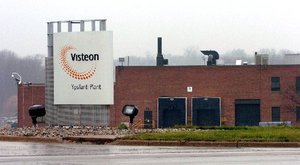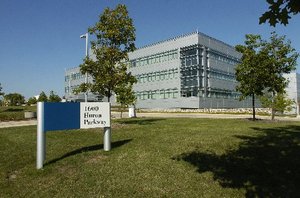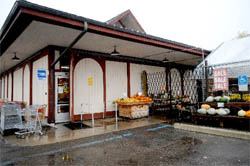Top 2009 Washtenaw County business stories
The economy was the top story of 2009 across the globe and continues to play out here in Washtenaw County.
Some of the leading local business stories from 2009:
• The automotive industry continued its massive changes, with varying results for Washtenaw County.
Ypsilanti Township learned its General Motors Corp. powertrain plant would close in 2010, and the employee count dropped from 1,364 to about 700 by August. That leaves the township scrambling to replace the taxes it will lose when its largest taxpayer closes - and hoping a new operator will fill the 5 million-square-foot facility.
Two Automotive Components Holdings plants lost potential buyers as deals fell apart for both the Milan and Saline ex-Visteon factories. But as corporate parent Ford Motor Co. rebounded, so did work in Saline. The factory was back to full capacity by fall after adding 300 employees to the 1,600 already working there at the start of the year.

Former Visteon plant in Ypsilanti.
And in Ypsilanti, which was left with a 1 million-square-foot factory when ACH closed its factory there in 2008, a buyer emerged. Angstrom Capital Holdings LLC, a growing auto supplier, plans to move jobs and operations to the facility in 2010.
Meanwhile, the presence of both Hyundai and Toyota continued to bolster the county’s engineering jobs base as the Asian automakers’ employment in the county remained stable.
• The University of Michigan finalized its $108 million deal to buy the former Pfizer campus in northeast Ann Arbor, renaming it the North Campus Research Complex.
The plan for the 2 million-square-foot facility is to expand U-M’s research capacity, targeting the most promising areas.
U-M is finalizing plans for which offices will first occupy part of the facility, with move-in likely to happen by the end of the first quarter.

North Campus Research Complex
Ann Arbor is losing tax revenue from the move to university-owned land. Also unclear is what kind of office vacancies the campus moves will leave.
But the city stands to gain as many as 2,000 highly skilled jobs in coming years - possibly more - as the facility takes shape.
• Entrepreneurial business growth also continued at U-M, symbolizing startup activity that economic development officials look to for ongoing jobs growth and economic diversification in the region and state.
U-M’s Office of Technology Transfer started eight companies and recorded a 20 percent boost in royalty income to about $15 million. The office also reaped $3 million in equity returns.
The number of startups was down. But that office also helped recognize 350 discoveries - which could germinate into startups - along with 151 patent applications and 78 license agreements.
This fall, the office moved to take business development further by launching a business creation services unit called the Michigan Venture Center.
• Ann Arbor’s best high-tech companies continued to attract attention from major tech companies.

HandyLab CEO Jeff Williams
Handylab was acquired by New Jersey-based medical device maker Bechton, Dickinson and Co. for nearly $300 million.
And NanoBio Corp. signed a licensing deal worth up to $55 million with GlaxoSmithKline of the United Kingdom.
Both continue on the path of health IT firm HealthMedia, which was bought in 2008 by Johnson & Johnson. The offices remained in the region with plans to grow.
• Extremely tight credit markets continued to challenge businesses and investors in Michigan and across the U.S. But local venture capitalists scored new success.
RPM Ventures raised $60 million for an IT investment fund, it announced in December.
That follows a blockbuster fund-raising round for Arboretum Ventures, which pulled together $73 million in fresh capital in early 2009.
And smaller businesses gained options, too: $1.8 million among four microloan funds started in Washtenaw County in 2009.
• Ann Arbor’s retailers fought to keep their footholds in their respective markets.
Domino’s Pizza, based in Ann Arbor Township, announced in December it has formulated a new pizza recipe that by early 2010 would be used in all of its 8,000 stores.
Border’s Inc. announced it would close its Waldenbooks chain - including the outlet at Briarwood Mall - as the Ann Arbor-based bookseller struggled to regain footing in the sector challenged by online and big box retailers.

Fresh Seasons Market closed in October.
Angele Cesere | AnnArbor.com
Some long-time businesses announced closings, like Shaman Drum, Fresh Seasons Market, John Leidy Shop, two Big Boy locations, Zanzibar, Chelsea’s Palmer Ford, and the Kroger in Georgetown Mall. Also closing was the Ann Arbor News after the corporate owners formed AnnArbor.com.
• Real estate sales stayed on track in 2009, with unit sales close to 2008 numbers for homes - and exceeding those numbers for condos.
But the numbers also told the story of falling values, driven in part by a glut of foreclosures that pressured prices. By the end of November, the annual dollar volume was down from 2008 by about $120 million.
- By AnnArbor.com’s Business Review staff.


Comments
Amber
Thu, Feb 25, 2010 : 11:21 a.m.
100 stores? I thought it was more like 50.
J----C------guy
Fri, Jan 1, 2010 : 11:35 p.m.
Borders is not closing the Walden chain completely. Over 100 stores will remain open. I believe that this is a very positive move. Closing underperforming stores or stores that are not profitable will strengthen not weaken the company. Borders chief rival, Barnes & Noble, has already closed almost all the B. Dalton stores.